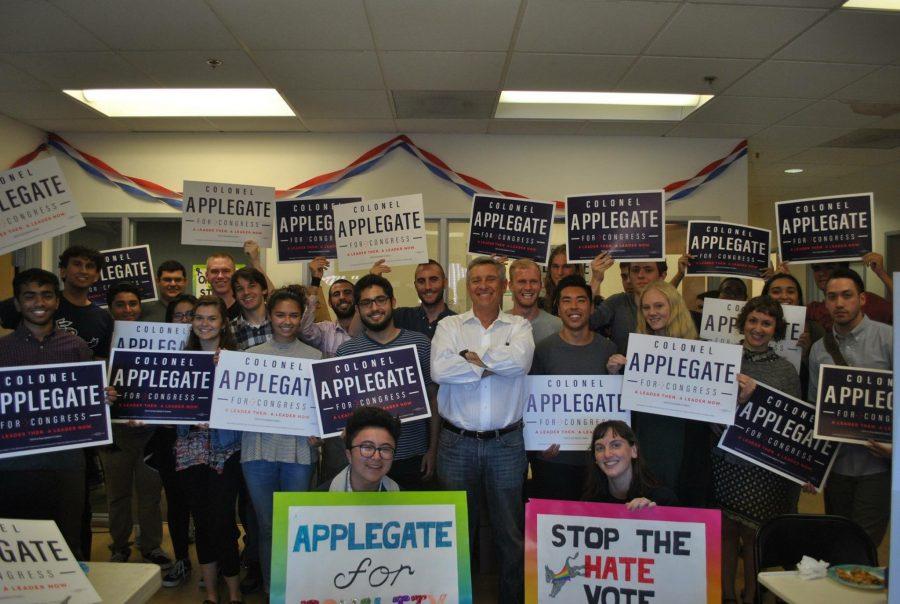With political campaigns in full swing now, candidates are constantly in the public eye, pitching policies, attending forums, shaking hands and kissing babies. From the national spread to the local angle, politicians seem poised and prepared, ready to amass votes and tackle this election running full speed. But what the public doesn’t see is what goes on behind-the-scenes.
SDA students have gotten the chance to get a look as they help with the group effort in campaigns, carrying out a variety of tasks leading up to election day.
Seniors Julia De La Fuente and Matt Benowitz currently work as an interns for the campaign of Doug Applegate, a Democratic congressional candidate for California’s 49th district. Their roles as interns involve managing social media platforms such as Instagram, doing donor research,working on spreadsheets and mail, going door-to-door to give out flyers, and conducting phone banking, a political strategy to collect voter data and get out the vote.
De la Fuente agrees that people often don’t realize how much work goes into a political campaign. “I’m working with so many people- UCSD students and other high school students-and everybody is doing so much work,” she said. “This past weekend I believe we made 8000 calls to voters, between about 20 interns.”
About the campaign environment, Benowitz added, “I was pleasantly surprised by how much of a welcoming atmosphere the campaign office is. Images from media such as ‘Primary Colors’ and ‘House of Cards’ shine a dark light on politicking. In reality, every political operative I’ve worked with is a strong proponent of volunteerism.”
Though there’s much work to get done each day, campaigns are also learning environments. Through contact with other high school interns, college students, and political figures, students have a chance to discuss issues and get to know the political process. “I would say I am much more respectful of those I disagree with than when I started my internship. Before a debate begins, each party must harbor the thought that people with very different beliefs can be equally intelligent,” said Benowitz. “I’ve [also] learned some very important things about our district (CA-49)…which demographics make it up, what problems it has which can be solved at the federal level, and how certain regions tend to vote.”
De la Fuente said the most important thing she’s learned is how high the stakes are, especially for this Congressional campaign. “Issa and Applegate are just polar opposites and people are becoming threatened or scared and that’s scary for me to have to deal with.” she said. “And what surprised me about political campaigns are how much money you need, and how mean people can be. I didn’t know people could be so vicious!”
The message Benowitz and De la Fuente want to send is this: get involved, and if able, get out and vote. Benowitz said, “I am a little concerned by the disinterest many of us may have in the democratic process. Even if one is too busy to actually work on a campaign like myself, they can still immerse themselves in the political process.” De la Fuente added, “Everybody who can should vote and people should figure out what their beliefs are and who they align with. Not caring isn’t a solution. Know you have a voice.”
Mauricio Medina, Deputy Field Director at San Diego City Council candidate Barbara Bry’s campaign, answered a few more questions about working at campaigns and student involvement.
Q: What’s important about having students come help out with the campaign? Benefits for you/benefits for them?
A: We are running a grassroots-driven campaign, so we rely heavily on our volunteers to help us to communicate with voters. Our political fellowship program for student interns is one of the cornerstones of our campaign. Fellows have been some of our most important volunteers and have been essential to getting out Barbara’s message.
The focus of our fellowship program is to provide students with useful skills and leadership opportunities. Communicating with voters builds confidence and valuable skills such as public speaking, organization, and persuasion. Students can apply these skills to their academic and professional pursuits. Working on a campaign also teaches students about local issues in their community.
Q: How do student interns contribute to the campaign?
A: Student interns help us with voter contact, which includes knocking on doors in the community and calling voters. Voters are generally responsive to students and were impressed that students were speaking with them about important civic issues. Campaigns are a great place for students to develop leadership skills and build their networks. Many of our interns have stepped up and have helped with leading trainings, recruiting volunteers, drafting social media posts, writing briefings, and preparing talking points.
Q: What has been the most exciting part of the campaign so far?
A: Primary Election Night, June 7th, was the most exciting part of the campaign. When Barbara entered the race, she was written off by all the political pundits. She had no name recognition and was up against a well-funded opponent who had nearly won the Primary in 2012. It took building a strong coalition of dedicated volunteers and interns working long hours to bring us to our near outright victory on June 7th. When early voting results were released on election night, they showed us at 49%. That was something special, because our opponent outspent us 2-1, and there were four other candidates running.
Q: How can students impact this election/What difference can they make?
A: Most of our students cannot vote in this election, but helping out on a campaign gives them a role in an election that impacts their community. Students from different backgrounds and different parts of the community can come together on a campaign to build a coalition and create a unified voice.
Q: Why is it important for young people to get involved in politics in general?
A: I think that there are long-term benefits to becoming civically engaged at a young age. If you assume that politcs is defined as who gets what, when, and where, then it’s critical for young people to be involved that conversation.
Q: What are some things that go on behind the scenes that people wouldn’t expect or know about?
A: I was surprised to see how flexible campaigns can be. There have been times when we have had to re-assess our methods, brainstorm, get creative, and then pivot our strategy based on new developments.
Also, I am impressed by how personally accessible Barbara is to voters. We’ve had almost 70 community coffees where Barbara met with voters in living rooms around the District. Barbara spent many hours on the phone with voters during phone banks, personally returned calls to answer specific questions, and freely distributed her personal cell phone number. She also canvassed the doors of over 6,000 voters herself. Barbara Bry plans to continue to be accessible to all residents in her District to ensure government is responsive.
Q: Any other insights you would like to share?
A: Working on a campaign is a unique experience because everyday is different, everyday you will be challenged, and everyday you can see the impact of your actions. Join one!

